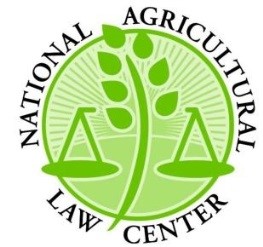A comprehensive summary of today’s judicial, legislative, and regulatory developments in agriculture and food. Email important additions to: camarigg at uark.edu
CASE LAW: Today’s cases include easements, Clean Water Act, PACA, Administrative Procedures Act, First Amendment, and bankruptcy.
In Arnold v. Arnold, 24 Neb. App. 99 (2016), defendant appealed an order determining the boundaries of easements across his land to access a well and underground pipeline. Appellate court affirmed ruling for plaintiff noting the Nebraska Supreme Court recognizes the “standard of necessity for an easement by implication of prior use is only reasonable necessity and that testimony regarding alternate routes of irrigation water are grounded in a strict necessity standard.”
In OREGON WILD, an Oregon non-profit corporation; FRIENDS OF LIVING OREGON WATERS, an Oregon non-profit corporation; & WESTERN WATERSHEDS PROJECT, an Idaho non-profit corporation; Plaintiffs; v. U.S. FOREST SERVICE, a federal agency; & U.S. FISH & WILDLIFE SERVICE, a federal agency; Defendants; & JRS PROPERTIES III, LP., an Oregon registered foreign limited partnership; Defendant- Intervenor, & WITHERS RANCH, INC.; BAR-2 LIVESTOCK, LLC; BRENDA MORGAN & JAMES R. BALDWIN, d.b.a. MORGAN RANCH; J-SPEAR RANCH CO.; OBENCHAIN CATTLE CO.; & O’LEARY RANCH, INC., Defendant-Intervenors., No. 1:15-CV-00895-CL, 2016 WL 3411554 (D. Or. June 17, 2016), plaintiffs argued defendants’ authorization of livestock grazing on allotments on the Sycan River is arbitrary and “contrary to the Endangered Species Act, the Clean Water Act, the National Forest Management Act, and the Wild and Scenic Rivers Act (WSRA).” Ruling for defendants, a group of ranchers, the court noted that the WSRA “recognizes that an agency can protect and enhance river values while simultaneously permitting uses that do not serve those goals.”
COFACE NORTH AMERICA INSURANCE COMPANY, Plaintiff, v. REED SAUL, INC. d/b/a GREEN GROCER, & DAVID GOLOMB, Defendants., No. CV 14-1044, 2016 WL 3406068 (W.D. Pa. June 21, 2016) involved claims under the Perishable Agricultural Commodities Act (PACA) trust provisions. The court noted that “to create a PACA trust and maintain trust beneficiary status, a produce seller must provide the buyer with notice of its intention to preserve trust benefits.”
In Ctr. for Envtl. Health v. Vilsack, No. 15-CV-01690-JSC, 2016 WL 3383954 (N.D. Cal. June 20, 2016), environmental groups argued the USDA violated the Administrative Procedures Act by issuing a guidance document in 2010 without providing public notice and comment. They argued formal rulemaking was required because the document “amended existing national organic food regulations to permit certified organic producers to use compost materials containing synthetic pesticides.” The court ordered USDA to drop its guidance on synthetic pesticides in organic compost and ruled it violated the law by not providing public comment.
Aldapa v. Fowler Packing Co. Inc., No. 115CV00420DADSAB, 2016 WL 3361807 (E.D. Cal. June 16, 2016) involved a farm laborers class action suit seeking review of a judge’s order requiring named plaintiffs to answer deposition questions identifying other class members. Appellate court ruled defendants did not show that their interest in obtaining the discovery “outweighed potential impact on First Amendment associational rights of the absent class members.” Plaintiffs were not required to reveal identities of those who met with class counsel.
In In re Gauger, No. 15-50120-RLJ-7, 2016 WL 3475305 (Bankr. N.D. Tex. June 17, 2016), the United States Trustee accused defendant debtors of purposely omitting and misstating items in their chapter 7 bankruptcy schedules. Court found no “fraudulent intent” by debtors.
In Craten v. Foster Poultry Farms Inc., No. CV-15-02587-PHX-DLR, 2016 WL 3457899 (D. Ariz. June 24, 2016), plaintiff alleged their child suffered serious injuries from salmonella poisoning linked to defendant’s chicken and brought strict liability, breach of implied warranty, and negligence claims. Plaintiff argued defendant’s affirmative defenses were “too vague to impart fair notice,” citing two US Supreme Court cases, Bell Atlantic Corporation v. Twombly, 550 U.S. 544 (2007) and Ashcroft v. Iqbal, 556 U.S. 662 (2009). Court concluded those cases “do not govern affirmative defenses.”
In PUGET SOUNDKEEPER ALLIANCE, Plaintiff, v. LOUIS DREYFUS COMMODITIES LLC, et al., Defendants., No. C14-803RAJ, 2016 WL 3458346 (W.D. Wash. June 24, 2016), plaintiff contended defendant violated the Clean Water Act by discharging grain materials into Elliott Bay. Court granted plaintiff partial summary judgment after finding deficiencies in defendant’s storm water pollution prevention plan (SWPPP).
REGULATORY: Includes AMS, FAA and GIPSA notices and rules.
AGRICULTURAL MARKETING SERVICE: Notice USDA will submit information collection requirement(s) to OMB for review. Title: Federal Seed Act Program. Info here.
FEDERAL AVIATION ADMINISTRATION: Rule that FAA amends its regulations to allow the operation of small unmanned aircraft systems in the National Airspace System. Details here.
GRAIN INSPECTION, PACKERS AND STOCK YARDS ADMINISTRATION: Rule that GIPSA suspends assessment of fees for supervision of official inspection and weighing services performed by delegated States and/or designated agencies under the United States Grain Standards Act. Info here.
